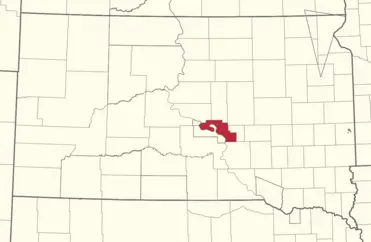In a historic move towards reconciliation and healing, South Dakota has witnessed a profound gesture from the Diocese of South Dakota. In the heart of the Crow Creek Sioux Tribe’s ancestral land in Crow Creek, St. John the Baptist Episcopal Church became the focal point of a transformative event. On August 16, South Dakota Bishop Jonathan Folts formally apologized for the diocese’s role in operating Indigenous boarding schools, setting in motion a renewed relationship between the Crow Creek Sioux Tribe and the Episcopal Church.

Crow Creek Chairman Peter Lengkeek (left) and Bishop Jonathan Folts (right) exchange gifts as a sign of reconciliation.
Bishop Folts’ apology addressed the tragic legacy of hundreds of boarding schools established from the 19th century onwards—a legacy shared by many religions and institutions, including the Episcopal Church. These schools were instruments of a federal policy aimed at forcibly assimilating Native Americans into the dominant white culture, often erasing Indigenous identities through severe measures. The ramifications of this dark chapter in American history are still felt among the Crow Creek Native Americans today, including issues such as health disparities and social challenges.
“The Episcopal Church’s history of participating in a system that took children from Native and Indigenous families—stripping them of language, story, and identity as sovereign peoples—cannot be undone. But it must be named,” Folts stated, emphasizing the significance of truth-telling in building positive relationships with tribes.
Chairman Peter Lengkeek, whose father survived boarding school, reflected on the emotional moment during his speech at the Diocese of South Dakota’s 2025 convention. “I could actually feel the conviction in every word and every breath. … That was definitely a gateway opportunity to a beautiful relationship and opportunities to heal.”
The Cherokee Dormitory in South Dakota, tied to the Episcopal Church, stands as a stark reminder of these boarding schools, where Indigenous children were subjected to harsh conditions and forced assimilation. Lengkeek poignantly described the enduring generational trauma as the ‘boarding school cycle,’ which perpetuates harm across generations.
To further this journey of reconciliation, Lengkeek presented Bishop Folts with a handmade Native American star quilt. This quilt, symbolizing wisdom, understanding, and the stages of life—infancy, youth, maturity, and old age—as well as the four cardinal directions, underscores the depth of cultural understanding and mutual respect being fostered between the tribe and the church.

Crow Creek Sioux Tribe Reservation in Central South Dakota.
As the Diocese of South Dakota looks forward, it has embraced initiatives focused on truth-telling and reconciliation. In collaboration with the Crow Creek Sioux Tribe, efforts are being made towards co-developing Indigenous-led initiatives. Moreover, the engagement is not solely about past acknowledgments but shaping a future of collaboration and equality.
In this spirit, Miskopwaaganikwa Leora Tadgerson, a member of the Bay Mills Indian Community and director of reparations and justice for the Diocese of Northern Michigan, shared insights during the convention. “It was great to see a bishop understand the spiritual needs beyond Indigenous ministries from a Christian lens, right into tribal sovereignty and self-determination,” she commented.
Indicating that this process is merely the beginning, Bishop Folts concluded, “It is the first of many steps as we seek to listen again, learn again, and rebuild trust again—with humility, courage, and hope.”
The collaborative efforts showcase the potential for transformation through reconciliation, paving the way for healing and justice. Both entities are planning regular meetings to deepen their relationship, demonstrating that this journey is ongoing—a testament to the power of redemption and the possibility of harmonious coexistence in South Dakota.
For continued updates on initiatives regarding Indigenous affairs and reconciliation efforts in South Dakota, residents and those interested can reach out via Email Shireen Korkzan.